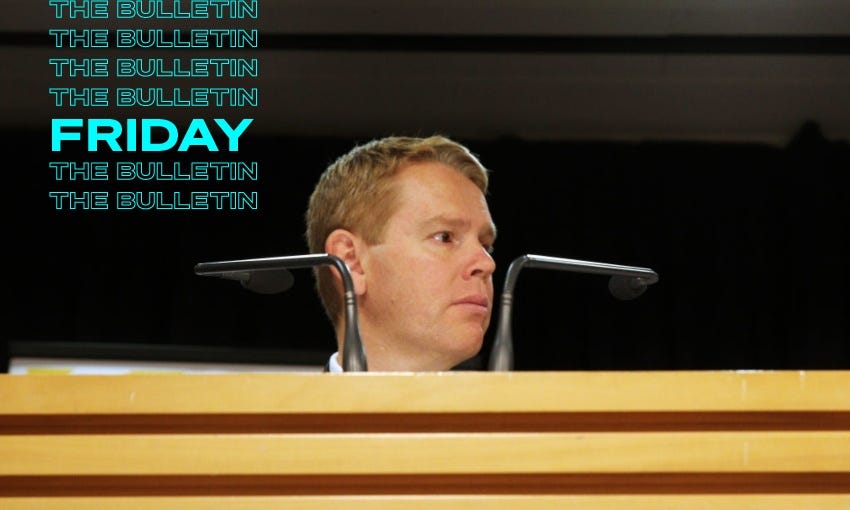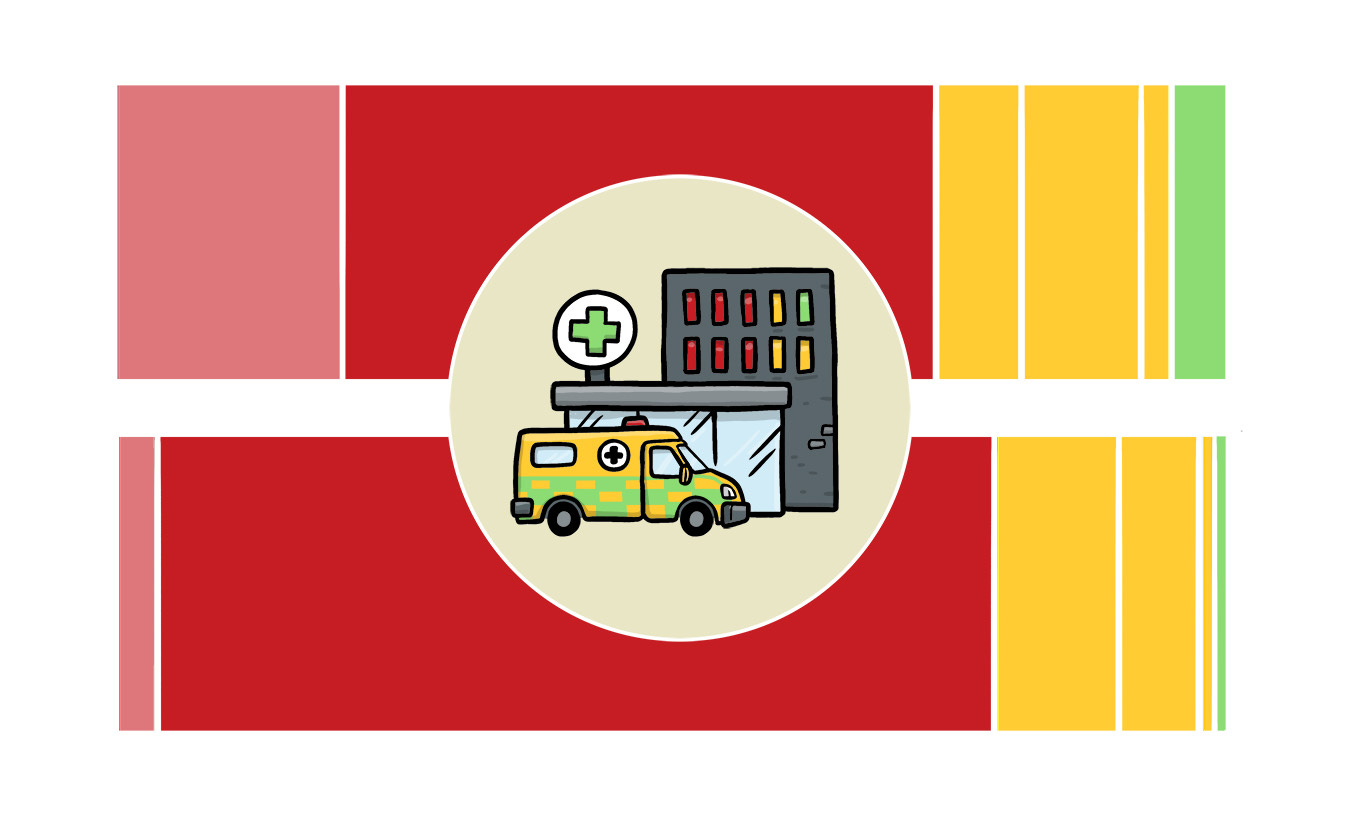MIQ stays shortened from next month
The country’s tough border rules are being relaxed, but going directly home to self-isolate won’t happen until next year
Mōrena and welcome to The Bulletin for Friday, October 29, by Justin Giovannetti. Presented in partnership with Z Energy.
In today’s edition: A new plan for Auckland transit; vaccine passports for domestic travel; a rollicking boardroom drama; but first, big changes to MIQ.
Covid-19 response minister Chris Hipkins in the Beehive (Lynn Grieveson/Getty Images)
It’s the beginning of the end of managed-isolation as we know it. Returnees will only need to isolate for seven days at border facilities from November 14, as the government has unveiled plans to begin slowly relaxing restrictions on travel. The end of MIQ won’t be speedy, as Stuff reports. For New Zealanders stuck overseas or those who want to travel to see family after nearly two years of isolation, the big changes won’t come until March next year, at the earliest. Until then, the move to halve the length of stays in isolation is expected to add an additional 1,500 rooms a month. There also won’t be a trans-Tasman bubble any time soon, with the prime minister comparing that to striking matches while standing in the middle of a wildfire.
So what’s the plan for MIQ? Starting in about two weeks, travellers will be tested three times in MIQ: on arrival, on day three, and on day six. After three negative tests they’ll go home on day seven and start self-isolating. On day nine, they’ll undergo a final PCR test and continue self-isolating until the test comes back negative. According to the government, only one in 2,000 arrivals tests positive for Covid-19 after day seven, so the risk to public health should be low. Unlike the reopening plan unveiled in August, this loosening of restrictions will only apply to residents and citizens, with no plans yet to allow for tourists, business people or students. As Andrew Geddis writes in The Spinoff, the change comes as the legal basis for the MIQ system has begun unravelling, with courts increasingly uncertain that the government has hit the right balance between rights and risks.
A look at the maths. After the changes were announced yesterday, I followed up with the team running MIQ to get a better sense of how many rooms will be freed up. There are currently 4582 rooms allocated in the border system. Of those rooms, 3742 have been booked by returnees while a further 840 have been set aside for community cases—over 200 Aucklanders are also self-isolating. Yesterday’s changes won’t really mean more spaces, an MIQ spokesperson confirmed: “We are hoping we can reinstate the level of rooms we had available for international returnees prior to the community outbreak in mid-August.”
What changes are coming next year? A more substantial change to the country’s border will come once all health boards have fully vaccinated over 90% of eligible people and the country transitions over to the traffic light system. After everyone takes some time to work out the kinks of the new system, in early 2022, restrictions will be further relaxed and fully vaccinated arrivals will be able to self-isolate at home. It’ll be just in time, because as Air New Zealand boss Greg Foran told Stuff yesterday, “the end of Covid is coming”.
It won’t come soon enough for a lot of people. Nash Forrester was one of thousands of New Zealanders watching yesterday’s announcement and wishing for more. The NZ Herald reports that he’s stuck overseas on an expired visa and can’t come home. He entered the MIQ lotteries without luck and applied multiple times for an emergency exemption to get into a border facility. He applied under a category for people sitting on expiring visas. Rejecting his requests, the government told the 21-year-old it doesn’t believe he’s exhausted all his options to get another visa. A number of you shared similar stories with me yesterday and I know these changes won’t be enough, but there’s some hope in the distance.
If you like what you’re reading, we need your support. The Spinoff is doing our utmost to keep you updated on Covid-19 related news. Every dollar our members contribute directly funds our editorial team and is devoted to ensuring we do more. Click here to learn how you can support the team today.
It could be Melbourne or London as the government eyes a transit plan for Auckland. The city should know by Christmas whether the Beehive has a spare $15 billion to build either Melbourne-style light rail, a London-like underground or a hybrid of the two. As Newsroom details, the government’s newest transport minister is taking a third shot at securing a plan for mass transit connecting the city centre to the airport. The previous attempts have been derailed by politics and fighting between Auckland council and Wellington officials.
The Covid numbers: There are 37 cases in hospital and 5 in ICU/HDU. There are now 1,365 active cases in New Zealand. 83 new community cases were reported in Auckland yesterday, 4 in Waikato and 2 in Canterbury. 39,220 people were vaccinated on Wednesday.
The Spinoff’s Covid data tracker has the latest figures.
Government considering vaccine passports for domestic travel. Following the discovery of two unvaccinated Covid-19 cases in Christchurch, after one travelled from Auckland, new restrictions could be coming. According to RNZ, Covid-19 minister Chris Hipkins said cabinet is considering a vaccine requirement for domestic travel, especially by air. It would be a complicated system and the government doesn’t want to stop the unvaccinated from truly essential travel. Air NZ has said it’s considering proof of vaccination for domestic flights.
There have been arrests at the anti-lockdown hīkoi. Two people camped at Mercer were arrested yesterday trying to cross into Auckland on foot via train tracks, Stuff reports. After a large convoy of vehicles carrying people protesting Covid-19 restrictions and vaccine mandates arrived at the city’s southern border, about 75 people remained camped out overnight. There have been significant traffic disruptions as a result of the situation.
Are you a keen consumer of local business journalism? We're looking to find out a bit more about The Spinoff's business audience, so if you've got five minutes to spare this morning we'd love for you to take a quick survey.
In defence of a payment for vaccinations. Writing in The Spinoff, Duncan Greive argues that the government should consider giving $250 to every person who is double-jabbed. That includes those who already are and will be. Getting to 90% fully vaccinated across all DHBs will be very difficult and vaccination levels have plummeted over recent weeks. The only way we’ll get across the line is by trying everything: food, shows, long conversations and cash. The NZ Herald (paywalled) also reports that 40% of New Zealanders have less than $1,000 in the bank, so a big US-style stimulus cheque for getting vaccinated probably wouldn’t hurt.
Forget TV drama, it’s all going down at Rogers. While my colleagues have been watching Succession, a real boardroom drama in Canada has kept me riveted. A coup to unseat the chief executive of one of the country’s big telecommunications companies began to unravel when the man who would be the CEO accidentally butt-dialed the sitting CEO, while detailing his plans to remove him. The next time you want to walk away from a movie because the bad guy gives away his plans and no one would ever do that, well, they do. That turns into an incredibly wealthy family imploding and a barefisted power struggle in full public eye. Slate has a good write up.
Got some feedback about The Bulletin, or anything in the news?
Get in touch with me at thebulletin@thespinoff.co.nz
Right now on The Spinoff: Siouxsie Wiles & Toby Morris look at how vaccines protect people using the data on case numbers and hospitalisations in the delta outbreak. Bernard Hickey writes about why the Tiwai Point power deal cost you up to $200 a year. Te Kuru o te Marama Dewes reveals that reclaiming te reo Māori is hardest within the home. While you’re at it, give Nē? a listen, it’s a new podcast by Māori, for Māori. Simon Day (partner content) writes about new micro tools to help you study on the job.
Beauden Barrett will start in his 100th test. Barrett will be wearing the number 10 jersey on Sunday’s test in Cardiff against the Welsh team as he becomes an All Blacks centurion, RNZ reports. It’ll be the team’s first game in Europe in nearly three years. The fact that it was a debate between starting Barrett or Richie Mo'unga shows that this is a team with a real depth of talent as it tours the northern hemisphere. Good luck, northern half of the planet.
That's it for The Bulletin. If you want to support the work we do at The Spinoff, please check out our membership programme.







